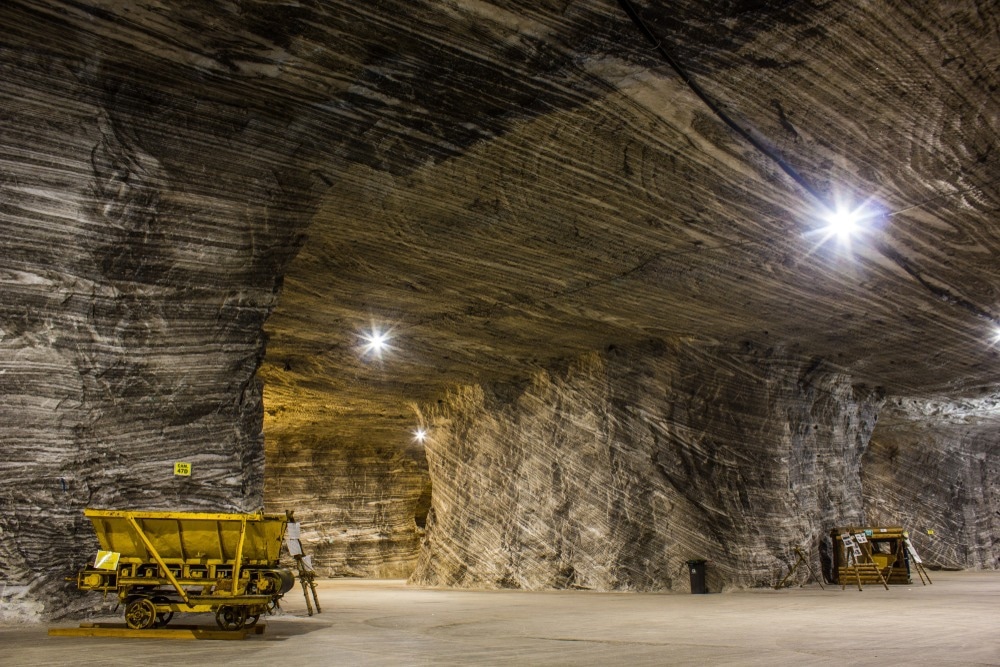
Image Credit: Maria Passer/Shutterstock.com
Why are Airflow and Pressure Important in Mines?
The future of mining is likely to be mostly underground and at progressively greater depths in isolated areas. Underground mines are primarily contaminated by harmful gases such as NOx, CO2, and CO from blasting and diesel-powered equipment, as well as naturally occurring methane and radon (in coal mines). To provide a safe underground mine working environment, proper ventilation is required. The objective should be to provide clean air to mine workers’ production zones.
Barometric air pressure variations have a significant effect on conditions in ventilation in deep mines' underground workings. Since pressure changes play a role in the transient states of ventilation environments, determining the magnitude of the pressure change is vital. As a result of the ever-increasing depths of the underground workings, the mining industry has regularly evaluated the potential dangers from exposure to fluctuations in barometric pressure to assess the potentially detrimental influence on underground employees' physical work capability and overall health.
Sensors Used to Monitor Airflow and Pressure
As a crucial aspect of underground mines extracting coal, remote monitoring and network design of the ventilation have become more computerized. Remote monitoring devices enable the observation of several characteristics of the underground mine environment.
A computerized control and monitoring system may offer real-time or instant data on every underground mine ventilation system branch. For example, the VENTISM system analyses air pressure or airflow changes in a subset of ventilation branches and simulates the airflow through the other branches.
On the other hand, the Simtars SAFEGAS system interprets the importance of gas analyses while plotting the gas standard ratios, which are used to evaluate fire temperatures and mine explosion risks caused by gases released due to oxidation of coal and fires.
The occurrence of a mine fire leads to the disruption in a ventilation network's usual functioning. Using mine fire simulation tools such as VENTGRAPH, it is possible to examine the link between mine fires and ventilation.
The differential pressure over a regulator or an opening may be measured reasonably easily and consistently. Typically, mechanical pressure sensors evaluate the mechanical reaction of an elastic diaphragm to the applied pressure. This reaction is then electronically measured using several methods, including variable resistance and strain gauges.
Electronic pressure sensors using piezo-quartz technology are currently widely accessible and have almost replaced mechanical pressure sensors. These feature great precision, dependability, and repeatability, yet some are readily susceptible to damage.
WIKA's Mobile Hydraulics (MH) series includes pressure sensors built exclusively for the mining sector. The entire MH sensor series has been designed from the bottom up to resist vibration and shock, temperature change, water infiltration, and electrical interference. Each pressure sensor is produced using a stable sputtered Wheatstone bridge and is hermetically sealed.
Importance of the Sensors in Mining
In a typical mine, ventilation supplies workers with fresh oxygen and air by regulating stratum levels and other noxious gases, particulates, and dust from workplace temperatures and diesel vehicles. The atmosphere of the mine must comply with governmental regulations. Ventilation models may also be utilized to determine the most efficient fan configurations for underground mining.
Being one of the most commonly used equipment in any tunneling or mining activity, underground mines require accurate pressure measurement sensors. Air is pumped in underground mining operations for ventilation and circulation. If a pressure disparity arises across the filters, it indicates that the filters need to be cleaned before they become ineffective and pose a safety hazard to the workers. Water boring is yet another area of application for pressure-measuring sensors. In the majority of mining regions, water is very scarce, necessitating the drilling of deep boreholes to access it.
Conclusions
Fresh air must be provided to the production areas in underground mines where employees are situated, and the inbound air may need heating or cooling. It is possible to develop software that can connect real-time data from the ventilation airflow monitoring sensors in underground mines to a network simulation tool to evaluate essential system data, carry out network simulations, and assess operational changes.
Mines can be found in regions of varying climates. Therefore, mining equipment must be able to work in a wide variety of temperatures. All electrical components, such as airflow and pressure sensors, must be adequately sealed and verified for operability in severe cold and hot temperatures.
New systems will need to justify productivity gains while being cost-effective. They will also need to simulate pollutant production, including vehicle heat, diesel, radiation, strata heat, and other gases, along with blast fumes.
References and Further Reading
Lundh, M., Nyqvist, J., Molander, M., Deep Breaths, ABB Corporate R&D, 2013, https://library.e.abb.com/public/09478993ee076991c1257d580041be79/ABB%20Review%202-2013_Optimizing%20air%20flowi.pdf
Wu, H. W., Gillies, A. D. S., Real-Time Airflow Monitoring and Control Within the Mine Production System, Eighth International Mine Ventilation Congress, 2005, https://ventsim.com/wp-content/uploads/2019/04/Real_Time_Air_Monitoring_Control.pdf
Lukat R., Pressure Sensor Technology in the Mining Industry, 2013, https://blog.wika.us/products/pressure-products/pressure-sensor-technology-mining-industry/
Franz, R.M., Schutte, P.C., Barometric hazards within the context of deep-level mining, The Journal of The South African Institute of Mining and Metallurgy, 2005, DOI: https://www.saimm.co.za/Journal/v105n06p387.pdf
Mining Technology, Under pressure: Why pressure measurement sensors are a mines most important device, 2019, https://www.mining-technology.com/sponsored/pressure-measurement-sensors-are-mines-most-important-device/
Disclaimer: The views expressed here are those of the author expressed in their private capacity and do not necessarily represent the views of AZoM.com Limited T/A AZoNetwork the owner and operator of this website. This disclaimer forms part of the Terms and conditions of use of this website.